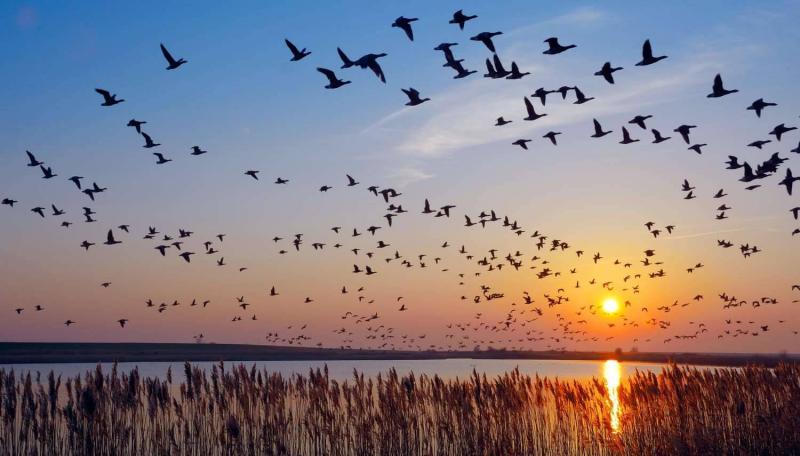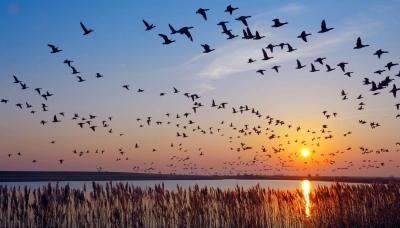"Killing migratory birds is illegal in Lebanon, but law enforcement is weak and birds are shot for pleasure only," began The Guardian's report on the killing of migratory birds in Lebanon without accountability. Empty cartridges are scattered in a meadow on Mount Trablus in northern Lebanon, where the valley lies along one of the busiest migratory routes in the world. The mountain summit, influenced by fierce winds, creates a natural corridor that encourages tired birds from long journeys between Africa and Eurasia to fly at lower altitudes. These low-flying birds are easy targets for hunters, says Michel Swan, director of the Lebanese Migratory Birds Association, noting that we inherited this culture from our ancestors, and that they were and still are mistaken.
According to BirdLife International, 2.6 million out of 2 billion birds are killed illegally each year as they pass over Lebanon during their seasonal migration between Eurasia and Africa. Lebanese law prohibits hunting migratory birds, but the lack of law enforcement, the financial crisis the state is suffering from, and the war on the southern borders mean there are few resources allocated for enforcing hunting laws. Among the thousands of birds shot, they are not eaten but left on the ground, and Swan believes they are hunted for mere enjoyment. If the birds do not die quickly, they often suffer a slow and painful death, being eaten by worms while still alive. Many hunters document the bird killing process in videos online, raising concerns that social media is incentivizing the killings.
On TikTok, hunters share videos of shooting birds, sometimes using military weapons. They slaughter birds to gain likes. "If they had no platform to post these videos, they wouldn't have shot these birds," says Swan. TikTok considers such clips not against its publishing policies, which encourages the killings. Swan, a former hunter, was transformed into a wildlife activist after witnessing the mass killing of birds. He mentions that every year, someone dies while hunting. Earlier this year, a teenage boy on a motorcycle was accidentally killed while hunting near Zgharta. Swan shares that one of his friends died while trying to protect the birds.
Today, Swan awaits the support of one of the three anti-poaching units recently deployed to the Mount Trablus area by the Internal Security Forces. A security source stated that despite the shortage of personnel, poaching is a priority for the Internal Security Forces, and hunters are being arrested and their weapons confiscated. In recent years, several bird species typically found in desert areas of Africa and the Gulf have been spotted in Lebanon for the first time, indicating that the climate crisis is affecting these birds' migratory routes. Dr. Nabigh Ghazal Aswad, program director at the International Fund for Animal Welfare, noted that these species have not been reported in these northern regions before, which can be primarily justified by climate change pushing them away from their natural habitats.
High temperatures can change the direction of warm winds and storms, causing birds to deviate from their migratory paths. The killing of predatory birds negatively impacts Lebanon's ecosystem, as these birds help control rodent populations. Without these birds, farmers are forced to use rat poison to protect their crops. Fawad Itani, president of the Lebanese Bird Protection Association, states that there are 414 bird species recorded in Lebanon, including 48 species of significant conservation concern, all of which are being hunted. He considered stopping poaching vital for maintaining local and global ecosystems, as these birds contribute to biodiversity by playing essential roles in pollinating plants and seed dispersal. The loss of these birds could lead to reduced pollination and decreased plant diversity.
In this context, the Lebanese Migratory Birds Association (Lamb) has called for the Trablus-Zgharta area to be designated as an important bird and biodiversity area by BirdLife International, but so far there is no funding to protect the region. Ibrahim Khader, director of BirdLife International in the Middle East, says that the area cannot be designated without data. On the road to Mount Trablus, environmental activists spend hours trying to save migratory birds and pick worms from their bodies; some birds fully recover while others may never fly again and might remain in the shelter for the rest of their lives. "This is sometimes a burden," Swan says. "The more there are, the higher the expenses." The Polish embassy has supported Swan since 2015 and encouraged him to establish the Lebanese Migratory Birds Association as an NGO. "Birds are a global treasure," says Przemysław Niesiołowski, the Polish ambassador to Lebanon. "They do not belong to one country - they are a global responsibility."




